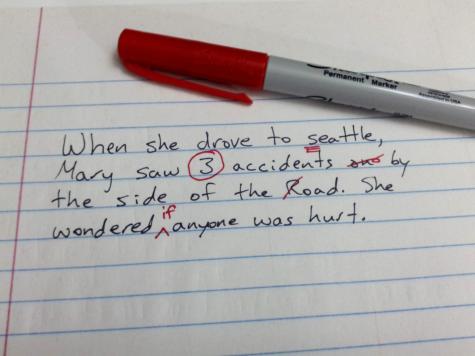First, let’s get some grammar terms out of the way, before I answer the question, to make sure there are no communication barriers between us as you read further.
Modifiers
Writing A-Z (Ebest et al) defines the term as follows:
“modifiers are words that describe, limit or qualify the meaning of a word or a word group. They are words,phrases, or clauses that add details, interest, or precision to writing.”
Two word groups carry out this job of ‘modifying’ in a sentence: adjectives and adverbs. They are not friends of Monotony, and it is their known practice to add on and embellish, for to them vivid words are better on the imagination than plain old ones.
Adjectives are words that only modify or tell us about nouns and pronouns, and it could take one word or a half dozen. So, yes, you won’t see them modifying any conjunctions, prepositions or any of the other SPOS (“Secondary Parts of Speech (POS); they love to hang with the naming-dropping sistas Ms Noun and Ms Pronoun. And one can guess why. *loud stage whisper* ‘Big League. They’re the ones with the real clout in the whole business of Sentence Construction.’
Look at this example:
Wind blew. (This sentence is without modifiers)
A gusty north-eastern wind blew. (Details now provided with (adjective) modifiers)
Adverbs are the modifiers you must also get to know as a writer. As adjectives are to nouns and pronouns, adverbs are to verbs, adjectives and other adverbs. They also modify phrases, clauses, or entire sentences.
To clarify my point, here are a few examples:
The graphics department used extremely bright colours.
(The adverb extremely modifies the adjective bright)
The midday gong sounded loudly.
(The adverb loudly modifies the verb sounded)
Phrase: a group of words which has no subject and does not express a complete thought, but may function as a single part of speech. A clause is a group of words which contain a subject and a predicate. Some clauses can stand alone and express independent ideas, hence we call these Independent clauses or simple sentences; those that cannot stand alone are called dependent clauses.
If you join a dependent clause (like this one you’re reading now) to an Independent clause, you’ll form a nice, grammatically sound complex sentence. But we’ll develop that concept in a future post.
Let’s move on to a common usage error related to the topic and how we can use these guiding principles to polish your writing.
How to Repair and Polish up Errors with Hyphenated Modifiers
When a compound ( a two-unit or three-unit) word acts as a modifier, the issue of hyphenation often comes up. Here is a typical question that I get:
Question:
12 year old girl, 12-year-old-girl or 12-year-old girl ?When writing about someone’s age, should I hyphenate the age? Which words should be hyphenated?
Answer:
To answer this question requires us to remember three rules of hyphenation as it regards modifiers. Here they are, with examples.
Rule 1: Two-word and three-word unit modifiers that express a single thought are usually hyphenated when used before a noun, for example, ‘a clear-cut decision’, ‘the third-floor rooms’, and ‘T-square’.
Rule 2: As long as a letter or numeral begins this unit modifier and it comes before a noun, it is correct to hyphenate. So, ‘12-year-old girl’ or its oft-used shortened version, ‘12-y-o‘ is correct.
Limit the number of hyphens you use to the modifier, though. Do not put a hyphen after the modifier as in this example: ‘12-year-old-girl‘, as ‘girl‘ is the noun being modified and not part of the modifying phrase.
The correct way is ’12-year-old girl’.
You might also want to pay attention to an exception to this rule.
Rule 3 states that when the modifying phrase is used after the noun, you don’t hyphenate it.
Hence, we add hyphens when we write:
A 12-year-old girl is the new Ms Jersey.
But notice what happens when the modifier is used after the noun it modifies:
The girl is 12 years old.
We add hyphens between ‘out-of-date’ which describes the noun ‘equipment‘:
Parts are hard to find for out-of-date equipment.
We leave them out now that the term is used after the noun, no longer modifies the noun, but now modifies the verb ‘was’.
The equipment was out of date.
PRACTICE TEST
Let’s test what we just learnt:
From each sentence group below, select the option or options (A, B, or C) showing the correct usage of the unit modifiers. (You may leave answers in the Comments box.)
1a. My six-year-old son has diabetes.
1b. My diabetic son is six-years-old.
1c. My six years old son has diabetes.
2a. A nine-inch gap was in the wall.
2b. The wall had a nine-inch-gap.
2c. The wall had a nine inch gap.
As we can see, modifiers can be tricky to work with, but can you imagine what our sentences and writing products would be without them? Pretty dull, right?
Applying patience, pace and lots of practice can go a far way in helping you learn a grammar and usage principle. Break down each grammar rule into digestible bits you can manage, learn the rule and then practice what you have learnt.
Are you ready to do that? Click to follow this blog and I’ll make sure to help you in your training. Send in your questions as well so I can help you find your answers faster. You can start now, by writing that niggling grammar, usage or punctuation error that you keep making and want to fix now in the Contact box below.


